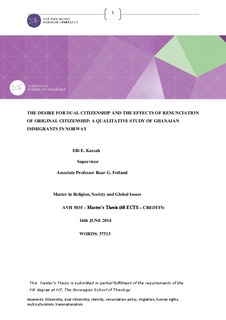The desire for dual citizenship and the effects of renunciation of original citizenship : a qualitative study of Ghanaian immigrants in Norway
Master thesis

Permanent lenke
http://hdl.handle.net/11250/223597Utgivelsesdato
2014-10-13Metadata
Vis full innførselSamlinger
Sammendrag
In today’s multicultural and shrinking world, citizens of many countries have the opportunity to emigrate from the countries of their birth to other countries where they live together with people with different biological and social backgrounds. As a consequence, the old citizenship policies of countries become outmoded and incapable of meeting the numerous challenges that the immigrants face. As far back as the 20th century, dual citizenship was seen as something disastrous and an enemy of the nation state. It was something which the nation state should avoid. Today, many countries including European countries have adopted or are considering the adoption of dual citizenship as an antidote to meeting the emerging challenges. However, Norway is not a part of this process of change, but rather operates with the policies of renunciation and selective dual citizenship for some of its immigrants. My thesis provides a discussion of identity issues associated with renunciation of citizenship and the consequences of the Norwegian non-dual citizenship rules for Ghanaian immigrants. The knowledge base of the thesis is embodied in the minds of fourteen Ghanaian immigrants living in Norway. I have adopted the qualitative research approach in generating and analyzing data for this thesis. Overall, the analysis reveals that most of my informants dislike the practice of renunciation as it has emotional and practical consequences for them. Also, most of the informants favor dual citizenship since it has many advantages for both countries. The purpose of this thesis is to generate debate and enlighten policy makers on the challenges that Ghanaian immigrants face with regards to the immigration policies in Norway. The main goal of this thesis is therefore to amplify the ongoing debate on the current citizenship laws and its implications for minority groups in Norway, in this case Ghanaians.